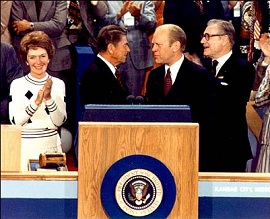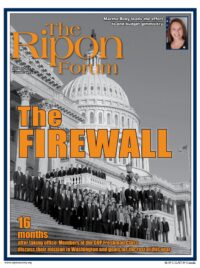
Mercifully for Republicans, the winter fantasy of a down-to-the-wire campaign in which the GOP presidential nominee would not be chosen until the national convention in Tampa failed to materialize. Time is of the essence in politics, and an incumbent president unopposed for renomination has a monumental head start over a challenger who has undergone a bruising primary process, let alone a candidate who does not clinch the nomination until the convention.
At a tumultuous Republican National Convention in Kansas City in 1976, the last time such a gathering was truly contested, President Gerald Ford overcame the persistent challenge of Ronald Reagan. But Ford’s narrow victory after a protracted primary campaign came at a cost. In a Gallup Poll taken in early August before the convention, Ford trailed the Democratic nominee, Jimmy Carter, by 25 percentage points. Ford gamely closed most of the ground and lost by two percentage points in the popular vote. Had he disposed of the Reagan challenge earlier, he might have been elected.
Although the 2012 campaign differs in many ways from the 1976 presidential contest, Mitt Romney and his team may be able to draw useful lessons from what happened in Kansas City’s Kemper Arena. Although Ford arrived there with a slight majority of pledged delegates, he knew that some of them privately preferred the crowd-pleasing Reagan. Ford’s team, led by James Baker and Dick Cheney, focused on trying to hold these “soft delegates” and were relieved when John Sears, the top Reagan strategist, decided to stake the Reagan challenge on a rules change.
Although the 2012 campaign differs in many ways from the 1976 presidential contest, Mitt Romney and his team may be able to draw useful lessons from what happened in Kansas City’s Kemper Arena.
The rule would have forced Ford to announce his vice presidential nominee in advance of the presidential nomination, as Reagan had done weeks earlier when he said that Senator Richard Schweiker of Pennsylvania would be his running mate. Sears believed that any running mate whom Ford might choose would alienate some of his delegates and provide an opening for Reagan. Ford’s team, however, much preferred a relatively antiseptic rules fight to an emotional platform battle that might give Reagan ballot momentum. Baker told me afterward that the Reagan forces could have put Ford on the spot with a resolution calling for the firing of Secretary of State Henry Kissinger, who was unpopular with conservatives. Ford would have been forced to oppose such a direct assault on a leading member of his cabinet and might have lost, showing a vulnerability that could have carried over to the nominating ballot.
In the absence of such a personal attack, the Ford team avoided confrontation by allowing Reagan backers to write most of the platform, including a plank offered by Senator Jesse Helms on morality in foreign policy that was a veiled rebuke to Kissinger though it did not mention him by name. A furious Kissinger threatened to resign if the Ford team did not oppose this plank. The writer Craig Shirley, author of an excellent book on the 1976 campaign, said Kissinger was told by a member of the Ford team that if he were going to quit he should do so immediately because it would help Ford win the nomination. Kissinger backed down, and the Helms plank sailed through. The Ford team’s task was made easier by Reagan and Sears, who responsibly shied away from crudely embarrassing the president. When I told Reagan about Baker’s suggestion that he might have helped himself with a resolution calling for Kissinger’s firing, Reagan replied, “I never would have done something like that.” Reagan wanted to lead his party, not wreck it.
Shirley believes that Romney should follow Ford’s 1976 strategy in Tampa and let conservatives have a free hand with the platform. This could even mean swallowing a plank opposing Obama’s health care plan — “Obamacare” — that also by implication questions the health care law Romney signed as governor of Massachusetts.
In contrast to the platform, Romney might be better off doing the opposite of what Ford did in 1976 when it comes to choosing a vice president. Ford was so busy trying to fend off the Reagan challenge that he hadn’t thought much about a running mate. His advisors were divided: Pollster Robert Teeter suggested the capable William Ruckelshaus, the first Environmental Protection Agency administrator and former acting FBI director. Political consultant Stuart Spencer proposed Anne Armstrong, a Republican stalwart who would have been the first woman nominee for vice president. Either of these daring suggestions would have contradicted the perception — unfair in my view but widely held — that Ford was incapable of bold action. Instead, Ford reinforced this stereotype by choosing Senator Bob Dole, a patriot who had served his country superbly on the battlefield and in the Senate. But Dole was unprepared in 1976 and proved a disaster as a running mate instead of the safe choice he was supposed to be.
Romney might be better off doing the opposite of what Ford did in 1976 when it comes to choosing a vice president.
In drawing lessons from the recent past in selecting a running mate, Romney might profitably examine two effective models from the recent past. The Democratic model is Bill Clinton. His selection of Al Gore in 1992 impressed the pundits and the public because it ignored conventional wisdom that a running mate should balance the ticket, by region, religion, ethnicity or gender. Instead, by choosing the person he considered the best man, Clinton sent a message that he would make decisions on their merits.
An even better model for Romney may have been provided by the iconic Reagan, who in 1980 won the nomination that had eluded him four years earlier. He did so by overcoming the opposition of virtually the entire Republican establishment, led by George H.W. Bush, who stayed in the race despite losing most of the primaries. Reagan did not think highly of Bush, who had backed down at a famous Nashua, N.H., debate and again in an impromptu confrontation in Texas. Aware of Reagan’s attitude, his entourage explored the idea of putting Gerald Ford on the ticket in what was quickly labeled a “co-presidency.” It never made sense. When the Ford trial balloon inevitably exploded, Reagan put aside personal feelings and picked Bush, uniting his party in a stroke. Reagan and Bush soon developed a mutual respect and working relationship that served Reagan well during his transformational two-term presidency and paved the way for Bush’s elevation to the White House in 1988.
Who is the man or woman who can help Romney unite his party in 2012 for the campaign to come? That’s up to him to decide. But Bush and other decisions, good and bad, of nominees at conventions past should give him food for thought. RF
___________________________________
Lou Cannon covered the 1976 and 1980 conventions as a reporter for The Washington Post and is the author of five books on Ronald Reagan, including the definitive biography of his presidency, President Reagan: The Role of a Lifetime.




